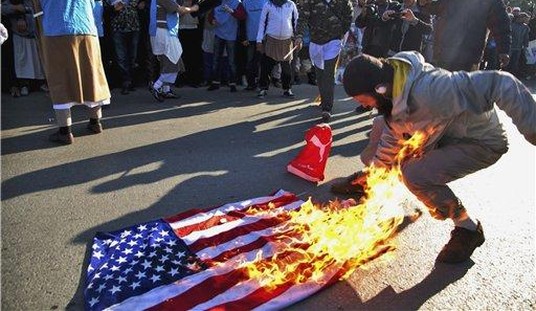Danger is supposed to be a great unifying factor. Convening the First Continental Congress of the Thirteen Colonies to forge a common response to the the British Parliament’s passage of the Intolerable (Coercive) Acts appears in retrospect to be a natural act. Benjamin Franklin famous observation that “we must, indeed, all hang together, or most assuredly we shall all hang separately” before signing the Declaration of Independence, an act of capital treason toward the British Crown, is easy to regard as a common sense observation.
But unity in the face of great adversity is not as automatic as commonly supposed. The word rout is defined as ‘a disorderly retreat or flight following defeat’. It expresses the natural condition following the collapse of order; it describes the primal impulse toward individual survival in the face of danger: every man for himself. Group survival may give everyone a statistically higher chance of pulling through, but it comes at the cost of requiring that some individuals assume greater risks than others. “Hanging together” is an act of group optimization. The response of the Founding Fathers toward the Coercive Acts may be much more atypical than we think.
For example, the politics of the Palestinian National Authority is one of factional, often murderous infighting. To depict it would be like playing a video of the Continental Congress in reverse: first in one room, than all over the place. The Foreign Policy Research Institute characterized its dynamics as follows:
Who will be the key players and factions in post-Arafat Palestinian politics? There are unfortunately far too many of them. Arafat’s legacy will be fought over by at least five major factions, three separate institutions, and fourteen different security agencies in his own group Fatah alone. That leaves aside the Islamist organizations and smaller PLO groups, and individual rivalries or ambitions within all these groups.
“Factions” is probably too precise a word. No real parties exist: there are no disciplined groupings or generally recognized charismatic leaders,. The structure is loose and rapidly shifting. Ideology is virtually non-existent; there is no meaningful Left, Right, and Center. In general, too, connections between local leaderships in the West Bank and the Gaza Strip are weak, and there is no clear hierarchy or chain of command. Arafat’s most likely legacy will be a kind of quiet anarchy in which different groups, local warlords, and security agencies operate on their own and ignore instructions from the “top.”
One of the great differences between the War of Independence and the Intifada is that Cornwallis actually had someone to surrender to. Israel has no one to make peace with.
The high degree of entropy present in a rout is not confined to Arab or Muslim cultures. Factionalism follows in the wake of every major breakdown. The famous French Resistance, which emerged after the Nazi victories of 1940, was really a collective name for a hodge-podge of groups who fought the Germans when they weren’t fighting each other. Charles de Gaulle, despite every effort, failed to unify the Resistance. In early 1942 he parachuted Jean Moulin into France with eventual orders “to form the Conseil National de la Résistance (CNR), a difficult task since each resistance movement wanted to keep its independence”. Not long afterward, Moulin was betrayed to the Gestapo, and suspicions linger to this day that Moulin was sold out consequent to factional infighting among Resistance groups.
The fragmentation of the Resistance ended with the arrival of an external force with sufficient energy to reimpose order on the system. That force of course, was the Free French Army backed by the Western allies. The arrival of Leclerc’s armor in Paris signaled not just the end of the Nazi occupation; it marked the beginning of the end of the Resistance as the main factor in French politics. In other cases, order is reimposed only after a prolonged factional conflict, when a victorious party amasses enough power to stamp its mold upon the country. But what happens when things never settle down to the point of anything approaching normalcy?
Perhaps one of the reasons why the Thirteen Colonies unified so successfully is that they contained enough pre-existing order to form a more complex structure: the United States. In many respects, the American nation existed before it declared independence. But in the tragic case of Gaza, there is no apparent source of free energy available to produce unity — the kind of unity competent to negotiate a meaningful peace. On the contrary, it may be in the interests of foreign powers to keep the pot boiling. And until a source of energy can be found to build up its civic society, events will go from pillar to post. Leo Tolstoy opened his novel Anna Karernina with the observation that “happy families are all alike; every unhappy family is unhappy in its own way.” Not everyone agrees. Robert Fulford called it “the silliest damn sentence ever set down by a great author” arguing the truth is quite the reverse: “experience and literature both demonstrate that happy families come in all shapes and sizes, but the burdens of unhappy families (emotional indifference, poverty, alcoholism, irresponsibility) are painfully predictable.”
But maybe Tolstoy got it right. Every functioning society shares with others the property that it has enough available energy to “hang together”. Every failed state has the property that it’s factions can hang each other in different ways.










Join the conversation as a VIP Member